
Guide to Build an App Like Airbnb
From the workflow to the technology to use, we covered everything in developing an Airbnb-like app for your vacation rental business.
After covid-19, the vacation industry is slowly recovering, and so does the vacation rental app.
Everything is supposed to be a feel-good tale, not just for large corporations but also for small firms.
As an entrepreneur, you must discover what the users(Guest & the host) like about the app and what exactly cures their pain points.
Like the straightforward workflow, the app structure, navigation, technologies, and how it makes the guest & host life easier.
This helps you to understand the current market and eventually gives you an idea of how you can build a better vacation rental platform for users.
However, in this blog, we are going to uncover the process of planning to execute your Airbnb-like app.
Without further ado, let's jump right into the workflow section.
Checklist before developing your Airbnb-like app
How Airbnb-like app work for the guest?
- Guest search for the rentals through the filter like destination, zip codes, search radius, pricings.
- After finding the rental, they sent a booking request.
- The amount will get deducted if the host accepts the booking.
- Finally, the guest can rate the host.
And the host workflow?
- The host lists their property with the rules, pricing, facilities, and available time.
- Then, they receive the booking request and have the freedom to either approve or reject the request.
- After the stay, the host receives their payout from the admin.
- Finally, they can rate their experience as well.
The workflow of the guest and host would give you an idea of - how your vacation rental app workflow should be.
Beyond that, if you find the regular workflow isn't up to par, you can customize the workflow as you like.
But ask yourself, "Will that make a positive impact?".
Define your app scope & target audience
Determining your app scope and target audience is something that needs to be done at the beginning - it's rather a primary thing.
Assume Brian Chesky is in a hotel and is looking forward to tasting his favorite non-veg meal. When he receives a menu that is overflowing with the vegan dish.
Now Brian is upset and wonders whether he has arrived at the wrong place, but he has not.
The thing is, nobody comes to a non-veg restaurant and orders veg food.
Knowing your customer's preference makes you serve well; otherwise, you're prone to give a bad experience.
For your case, examine your target audience & know what feature they prefer. Knowing all this could make a big difference.
What do I mean by the scope of an app?
It describes what the app is meant to accomplish, what problems it hopes to tackle, and what capabilities it will offer its users.
And you were figuring out the features, functionalities, and services that your Airbnb-like app would encompass.
Figuring out the scope helps you outline the necessary component and resources needed for the development.
Then, the target audience?
Understanding your target audience gives you an idea of who they're.
It indulges factors such as demographics, travel preferences, and booking behaviors.
Following such research on your target audience, you can develop a better Airbnb alternative platform that captives your users.
Consider these features for your Airbnb-like app
1. User registration & authentication
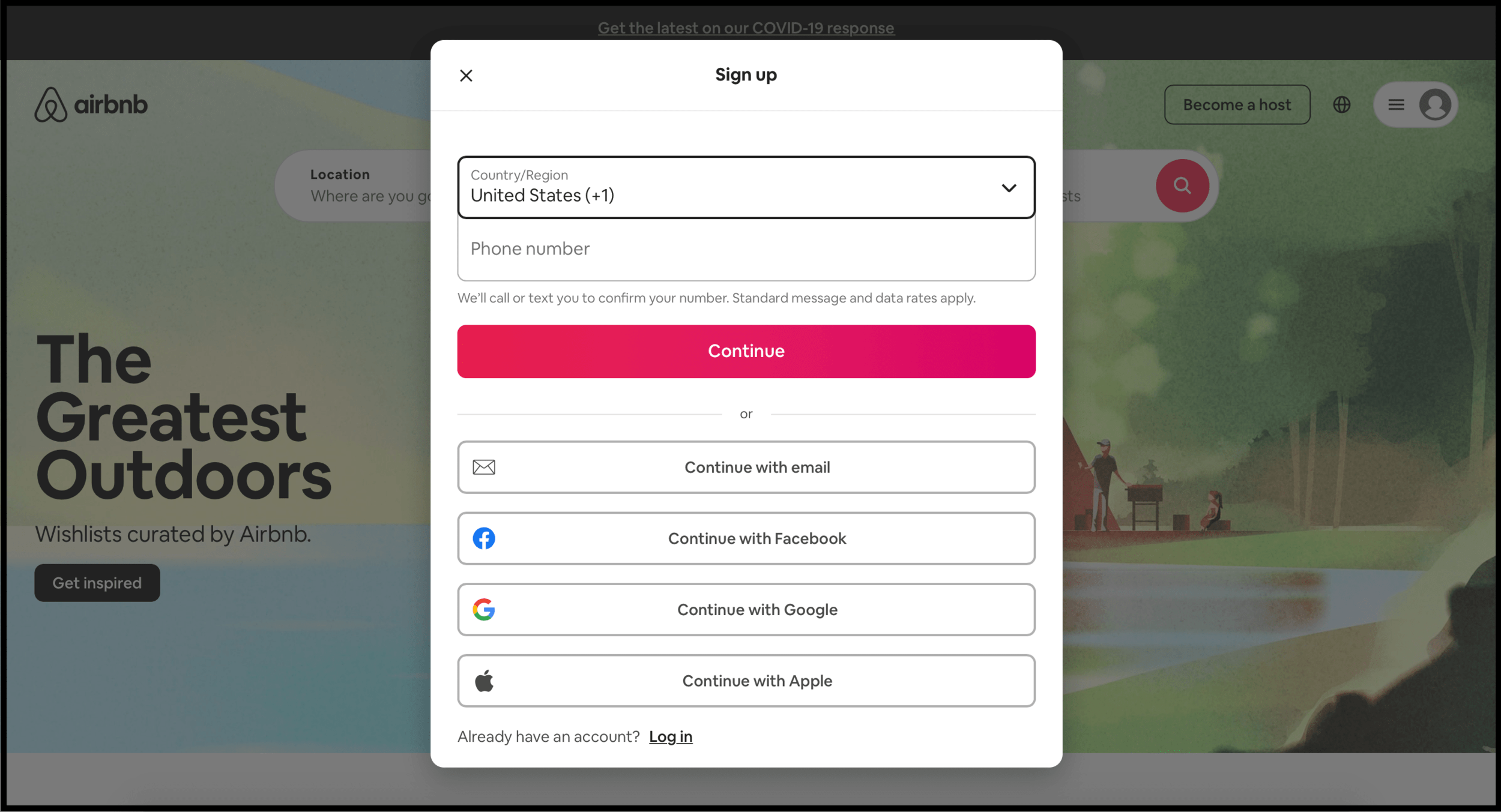
Now we have come to the most crucial part.
The user verification and authentication process help you to onboard valid guest and hosts.
This process is familiar to everyone before accessing the web and mobile apps.
When a host attempts to access your platform, you can request their e-mail address, phone number, and government identification.
After they logged into the platform, you can ask them to complete the further process, such as profile competition, payment details, and the listing process.
Coming to the guest - the rule here is to make the onboarding process effortless for them. Collecting e-mail addresses and phone number is enough if you would ask.
2. Search

Imagine this scenario: When a guest tries to approach your platform, which holds around 10,000+ listings.
Wouldn't hard for them to find the property?
That is why a search bar comes top priority.
It makes the task of finding rental property easier and more steadfast.
Search filters like countries, pricing, type of rental, amenities, and facilities, and you can add more based on your guest's preference.
3. Listing
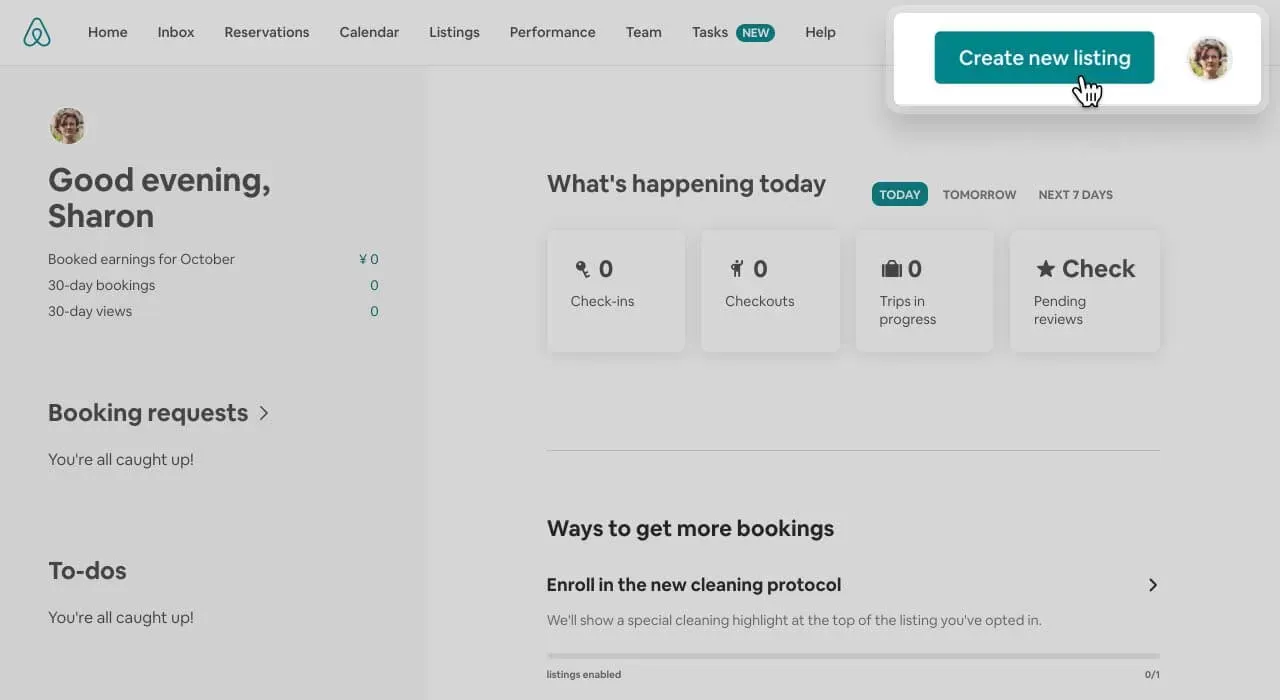
Listing features enable the host to list their property in the platform.
The features themselves require a workflow. It entails submitting the property details from top to bottom.
Don't make the process of listing complicated for the host.
4. Booking
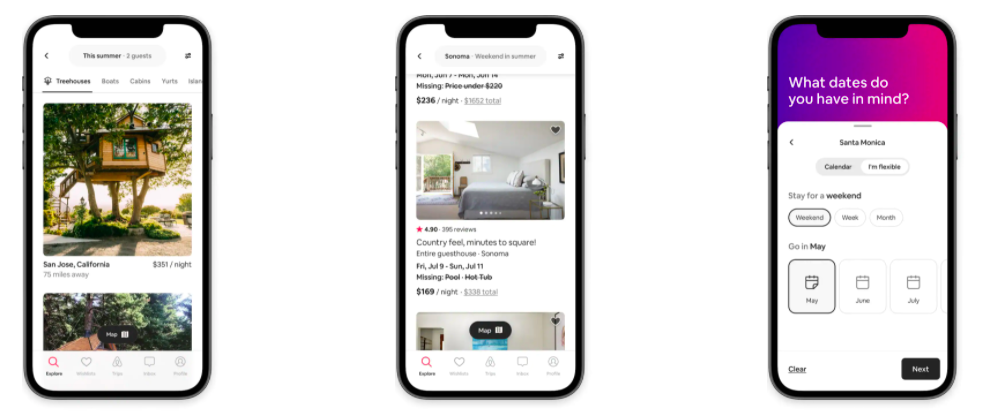
If you can remember our discussion-related search filter, following that process, the guest finds the property, and what?
They need to book.
In late 2017, Airbnb introduced a new way of booking called instant booking.
Before that, if the guest sends a booking request, the booking had to be accepted by the host. If not, the booking gets canceled.
But instant booking works differently; in a way where the booking gets active without approval.
When considering this instant booking feature, let the host tweak the way they prefer. Like they want “instant booking” or “request to booking”.
5. In-app messaging
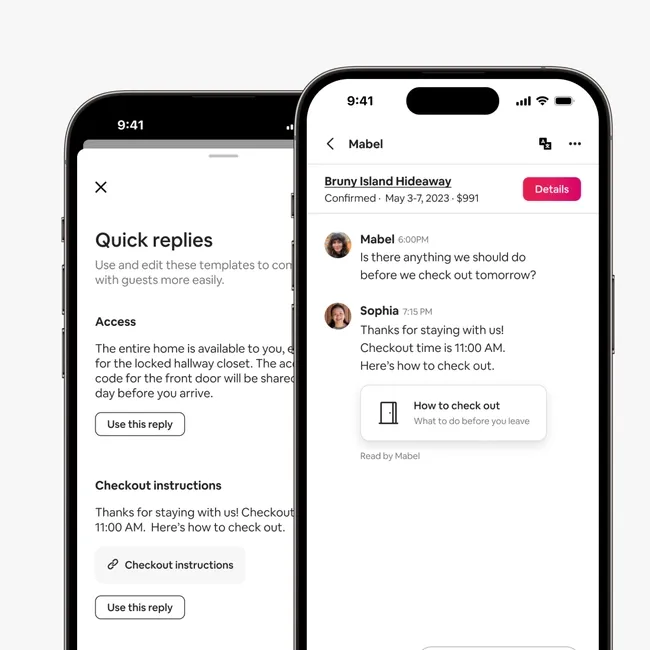
It allows guests and hosts to chat with each other through the app. And this way has been convenient since it allows both users to discuss the stay.
But in most Airbnb-like apps, guests can't chat until the host accept the booking request.
After the booking gets accepted, threats open between the guest and the host, which allows them to chat.
This workflow of in-app messaging can mitigate your host's discontent with receiving unknown message requests.
6. Payment gateway
Stripe, PayPal, Amazon Pay, and there are some options when it comes to choosing a payment gateway for your platform.
It ensures that the transaction takes place safely and securely on your platform by acting as an intermediator between your app and the bank.
Furthermore, it helps in many ways.
That is, offering multiple payment options like cash, credit/debit, and wallet.
For international bookings, it allows the guest to switch to their preferred currency, allowing them to make payments through their currencies.
And it verifies the authenticity of the transaction. For instance, when using a credit card, it may check for the card's validity, available credit, and address verification.
7. Reviews and ratings

Reviews and ratings can enhance your user experience. Ask me why?
By making it available, the guest can rate & review the host based on their experience, and the host can do the same.
Moreover, the guest and host get judged through this system. Therefore, they would eventually be bound to act conscious of getting good reviews & ratings.
Good ratings mean - more bookings for the host - a rise in the chance of acceptance for guests.
To sum up, this feature is a win-win for both users and Airbnb-like apps.
8. Calendar integration
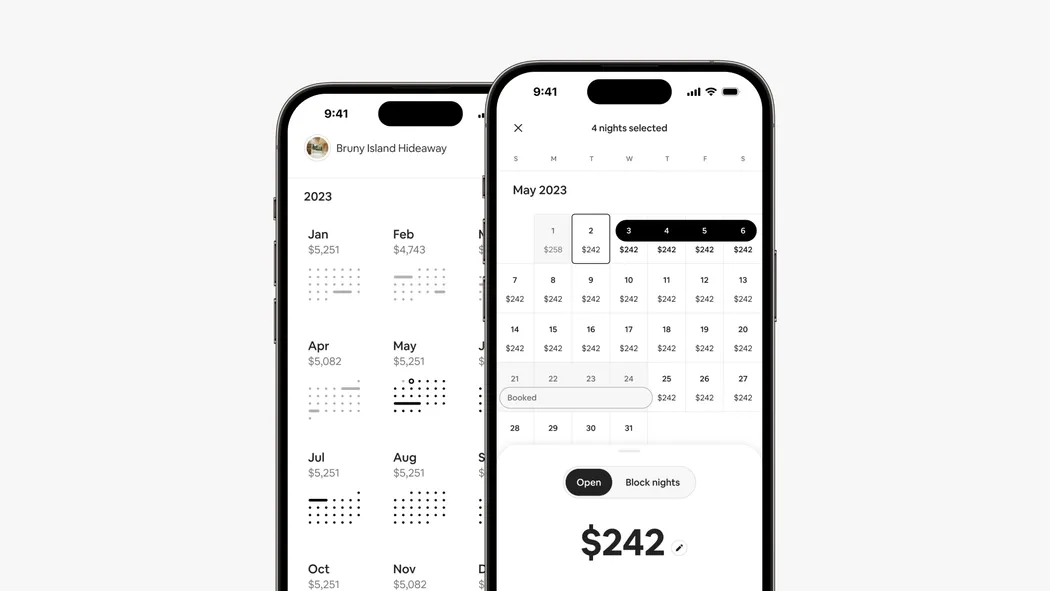
It enables two different applications to sync together and share data across the calenders - thus, it avoids duplicating calendar entries or overlapping bookings.
To put you simply, it prevents multiple guests from booking the same property on the same date.
On the guest side, this feature is helpful to check the available listing and book the check-in and check-out dates.
On the host side, it helps to display their property's availability, set minimum and maximum stay durations, and avoid double bookings.
Before choosing the best calendar for your Airbnb-like app, determine the calendar that would align with your tech stack.
To mention some, Google Calendar API, FullCalendar, React Big Calendar, and react-dates come under the list.
Choosing the right technology for your platform
Technologies play a big part in developing your web & mobile app for your vacation rental business. You need to consider a mix of technologies and components for that.
⭐ Front-end Development:
Use HTML, CSS, and JavaScript to craft a user-friendly interface with smooth interactions.
For building dynamic and responsive UIs, you can rely on popular frameworks like React, Angular, or Vue.js.
⭐ Back-end Development:
Your choice of server-side language could be Python, Ruby, Node.js, Java, or any language that suits your team's skills and project requirements.
To streamline back-end development, you can opt for web application frameworks like Flask (Python), Ruby on Rails (Ruby), Express.js (Node.js), or Spring (Java).
A robust RESTful API will facilitate seamless data exchange between the front end and back end.
⭐ Hosting and Infrastructure:
To ensure scalability and reliability, cloud hosting services such as AWS, Google Cloud Platform, DigitalOcean, or Microsoft Azure are popular choices.
Coming to mobile app development
When it comes to development, you can consider a two-way, native app development or a cross-platform framework like React Native or Flutter.
⭐ Native development?
It refers to the process of using different tools for the Android app and iOS app—such tools as Swift or Objective-C and Apple's development tools like Xcode for iOS apps.
While for Android, it involves using Kotlin or Java and Android Studio.
⭐ Cross-platform development?
It is the process of creating an application that can run on multiple operating systems and platforms in a single codebase.
Instead of building separate native apps for each platform (e.g., iOS and Android), cross-platform development enables developers to write code once and deploy it across multiple platforms, saving time and effort.
Developing an app like Airbnb is no easy feat, and it comes with the cost of meticulous planning, robust coding practices, and continuous maintenance.
We have seen quite a lot of development which incurs an enormous time and money.
If you’re not conveniently investing your resources in custom development, there comes your alternative - a readymade solution.
What is a readymade solution?
The readymade solution is the pre-build app, which is in complete contrast to the custom development.
It comes with in-built features and functionality that helps entrepreneur launch their app-like Airbnb.
Even though it's a readymade solution, you can customize the source code, like adding new features and designs to your platform.
And if we uncover the cost of a readymade solution, it costs 10% of what custom development demands.
If you're interested in a readymade solution, check out Airbnb Clone, a pre-build vacation rental solution.
Test & launch your app
Once you've developed your platform, whether through custom development or a readymade solution.
Remind yourself that it isn't finished yet.
You have to go through the last phase known as testing and there are different types of it.
Let’s uncover those!
1. Quality analysis
QA specialists conduct comprehensive testing to ensure your platform is ready for the market.
They will test all functionalities, including user registration, property listing, search and filters, messaging, payment processing, reviews, and more.
2. Beta testing
Consider a beta test before the main launch.
Invite a small group of users to put your vacation rental app through its paces in real-world environments.
Collect feedback from those users to learn about their experiences, preferences, and ideas for improvement.
3. Performance testing
Examine the app's performance under various scenarios, including variable network speeds and user loads.
Make certain that the app remains responsive and works well even during peak hours.
Enough of testing!
Building your app-like Airbnb is not an effortless path, but it is possible with sheer coordination and commitment.
The listed above sections are crucial to note while or before developing your vacation rental platform.
I hope you get the most out of this blog.
Build your Airbnb-like app with us
Disclaimer: The term 'Airbnb' is only used for marketing purposes, and we are not associated with the company in any form. The source code and design of our products are fully owned by us. We do not indulge in using copyrighted materials.




